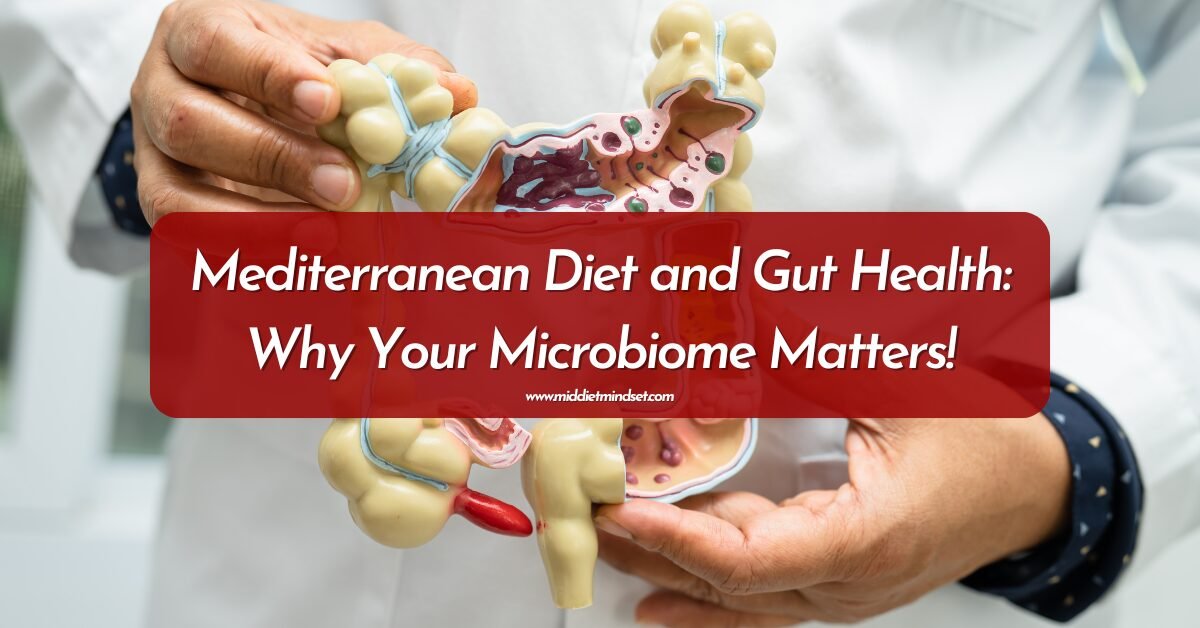Table of Contents
ToggleWhen it comes to wellness and weight management, the Mediterranean Diet and gut health are often the hidden powerhouse behind sustainable results. The connection between the Mediterranean Diet and gut health significantly aids enjoyable, nutritious, and sustainable weight loss. If you’re tired of diets that leave you bloated, sluggish, or hungry, the Mediterranean Diet might be the balanced, gut-friendly solution you need. By focusing on whole, nutrient-dense foods, it supports a healthy gut and, ultimately, more lasting weight loss results.
Let’s explore how this diet boosts gut health and nourishes your microbiome to enhance your weight-loss journey!
What Is the Gut Microbiome, and Why Does It Matter?
The gut microbiome is a complex community of bacteria, fungi, and other microbes living in your digestive system. In essence, you can think of it as a bustling ecosystem, where some microbes actively support your health, while others may potentially cause harm if they grow out of balance. When this ecosystem thrives, it positively impacts everything from digestion to immune function, but if disrupted, it can contribute to issues like inflammation, digestive discomfort, and even challenges in weight management. This delicate microbial balance affects almost everything—digestion, nutrient absorption, immune health, even your mood. But most relevant here is how a balanced microbiome through the Mediterranean Diet impacts metabolism and weight control.
Gut Health and Weight
Research shows that an imbalanced gut microbiome can increase inflammation, trigger bloating, and disrupt digestion. Over time, this imbalance can make it harder to lose weight and may even contribute to weight gain. Conversely, a diverse and balanced microbiome promotes healthy digestion, helps regulate hunger hormones, and makes your metabolism more efficient—all of which can support sustainable weight loss.
In my nutrition practice, I’ve seen this firsthand.
Many clients come to me frustrated by diets that leave them feeling weighed down. Poor gut health is often the culprit. By switching to a Mediterranean-based approach, they achieve better digestion. This shift also helps them cultivate a healthier relationship with food. Over time, these clients experience physical improvements and a renewed sense of well-being. They find greater enjoyment in their meals as well.

How the Mediterranean Diet Supports a Healthy Microbiome
So, you might be wondering, how exactly does the Mediterranean diet improve gut health? To start, this diet is rich in fiber, plant-based foods, and healthy fats, which together support good gut bacteria while limiting the growth of harmful microbes. Now, let’s take a closer look at the key components that make it so effective in promoting gut health through the Mediterranean Diet.
1. Rich in Fiber
Firstly, fiber is essential for a healthy gut, and when it comes to gut health, the Mediterranean Diet is a perfect match thanks to the ample fiber it provides. For example, fiber-rich foods like fruits, vegetables, whole grains, and legumes act as prebiotic powerhouses—meaning they feed the good bacteria in your gut. As a result, these beneficial bacteria thrive on fiber, which helps boost digestion, reduce inflammation, and maintain that vital microbial balance.
In my own experience, fiber has been one of the most noticeable elements in my journey with gut health. For instance, after adding more fiber from Mediterranean staples like chickpeas, leafy greens, and oats, I felt a huge difference in my digestion and energy levels. Similarly, as my clients increase their fiber intake, they also report feeling fuller for longer, which ultimately makes it easier to stick to their health goals. If you’re curious about different types of fiber, their sources, and how they support weight loss, don’t miss my article: Fibers on The Mediterranean Diet: Sources and Their Health Benefits For Weight Loss.
2. Anti-Inflammatory Effects
One of the key benefits of the Mediterranean diet is its inclusion of anti-inflammatory foods like olive oil, fatty fish, nuts, and seeds. Specifically, these foods are rich in omega-3s, antioxidants, and polyphenols—compounds that actively help reduce inflammation. By doing so, they protect the gut lining and support the growth of healthy bacteria. As a result, gut health, supported by the Mediterranean Diet, thrives with these anti-inflammatory properties. For a deeper look into the role of inflammation in weight loss and how the Mediterranean diet can make a difference, don’t miss my article: Inflammation with the Mediterranean Diet: The Science of Lasting Weight Loss!
Furthermore, chronic inflammation, especially in the gut, is a major roadblock for weight loss. Specifically, it disrupts digestion and hampers metabolism. However, by incorporating anti-inflammatory Mediterranean foods, you’re creating a more supportive environment for a balanced microbiome and, ultimately, a healthier body. To dive deeper into the foods that fight inflammation within the Mediterranean diet, be sure to check out my article: Anti-Inflammatory Mediterranean Foods to Add to Your Plate Today!
3. Diverse and Balanced Foods
One of the beauties of the Mediterranean diet is its variety. In fact, it encourages eating a colorful range of fruits, vegetables, lean proteins, whole grains, and healthy fats. Moreover, this variety fosters both the Mediterranean Diet and Gut Health by nourishing a broad spectrum of gut bacteria, which in turn helps to cultivate a balanced microbiome.
4. Reduced Processed Foods
Furthermore, highly processed foods are often loaded with sugars, artificial additives, and unhealthy fats, all of which can feed harmful bacteria. In contrast, gut health benefits from the Mediterranean Diet’s focus on limiting processed foods in favor of whole, nutrient-dense options. As a result, this naturally helps your gut bacteria flourish while keeping inflammation in check.

Top Mediterranean Diet Foods for Gut Health
If you’re excited about trying the Mediterranean Diet and get gut health benefits, here are some of the best foods to include in your meal plan. Each one of these supports a balanced microbiome while being satisfying and delicious!
Olive Oil
High-quality olive oil is rich in polyphenols, compounds that act as prebiotics by supporting the growth of beneficial bacteria.Olive oil also has anti-inflammatory properties, which is a win-win for gut health and weight management. Drizzle it on salads, roasted vegetables, or whole grains for added flavor and health benefits.
Fruits and Vegetables
From tomatoes and bell peppers to leafy greens and berries, fruits and vegetables are fundamental to the Mediterranean Diet and Gut Health. They’re high in fiber and packed with antioxidants, which protect the gut lining and support good bacteria.
Legumes and Whole Grains
Legumes, such as chickpeas, lentils, and beans, as well as whole grains like quinoa, farro, and oats, provide both fiber and essential nutrients. These prebiotic foods feed beneficial gut bacteria, creating a healthier microbiome and aiding digestion.
Fermented Foods
While not a Mediterranean staple, you can add probiotic-rich fermented foods like yogurt or kefir. These contain live cultures that introduce beneficial bacteria to the gut, complementing the prebiotics in other Mediterranean foods.
Nuts and Seeds
Rich in healthy fats and fiber, nuts (like almonds and walnuts) and seeds (like chia and flax) are excellent for gut health. They support a strong gut lining and keep inflammation low, all while adding a satisfying crunch to your meals.
How Improving Gut Health Can Aid in Sustainable Weight Loss
You might wonder, “How does a healthy gut actually help with weight loss?” When you improve your gut health, several positive effects kick in, each of which can make it easier to lose weight and keep it off.
Improved Digestion and Absorption
A balanced microbiome ensures that you’re absorbing nutrients effectively, which can prevent cravings driven by nutrient deficiencies. When you’re nourished, you’re less likely to reach for unhealthy snacks and can stick to your weight loss plan more easily.
Regulation of Hunger Hormones
Certain gut bacteria play a role in regulating hunger hormones, like ghrelin (which makes you feel hungry) and leptin (which signals fullness). By improving your microbiome, you’re setting the stage for better appetite control, making it easier to eat in moderation.
Reduced Inflammation and Enhanced Metabolism
Inflammation in the gut can slow down your metabolism and lead to weight gain. But by eating a gut-friendly Mediterranean diet, you can reduce this inflammation, improving metabolic function and making weight loss more attainable.
Practical Tips to Begin a Gut-Healthy Mediterranean Diet for Weight Loss
If you’re ready to give the Mediterranean Diet a try for both gut health and weight loss, here are some practical tips to help you get started smoothly.
Start Slowly with Fiber-Rich Foods
If you’re new to a high-fiber diet, start slowly to avoid digestive discomfort. Gradually add fiber-rich foods like lentils, leafy greens, and whole grains, allowing your gut time to adjust.
Focus on Variety
Aim to include a wide range of Mediterranean foods throughout the week. Try mixing up your fruits, vegetables, proteins, and grains to support a diverse microbiome and keep your meals interesting.
Reduce Sugar and Processed Foods
Minimize sugary and processed foods as much as possible, as they can feed harmful bacteria and disrupt the gut’s natural balance. Instead, opt for naturally sweet foods like berries or an occasional date for a treat.
Hydration Matters
Don’t forget to drink enough water! Hydration is crucial for digestion and helps the gut lining function optimally. It also helps fiber do its job more effectively, supporting regularity and overall gut health.
Conclusion
The Mediterranean Diet offer a delicious, balanced approach to both gut health and sustainable weight loss. By focusing on high-fiber, anti-inflammatory foods and limiting processed options, this diet cultivates a balanced microbiome that aids digestion, improves metabolism, and makes weight management more achievable.
So if you’re looking to enhance your wellness journey with a diet that’s both satisfying and gut-friendly, the Mediterranean Diet could be exactly what you need. A happy, healthy microbiome isn’t just a boost for your digestion—it’s a powerful tool for reaching your weight loss goals and living a more energized life.
F.A.Q
The Mediterranean Diet promotes gut health through its emphasis on high-fiber foods, healthy fats, and variety. Here’s how it works:
- High Fiber Content: Foods like fruits, vegetables, legumes, and whole grains feed beneficial gut bacteria, enhancing digestion and nutrient absorption.
- Healthy Fats: Olive oil and fatty fish are rich in omega-3s and antioxidants, which reduce inflammation and support a balanced microbiome.
- Diverse Food Choices: A wide range of foods ensures a varied microbiome, promoting the growth of beneficial bacteria.
Incorporating these elements into your meals can lead to improved gut health and contribute to sustainable weight loss.
The best foods for gut health within the Mediterranean Diet include:
- Fruits and Vegetables: Aim for a colorful variety, such as berries, leafy greens, and tomatoes, which are rich in fiber and antioxidants.
- Whole Grains: Opt for quinoa, farro, and brown rice to increase fiber intake and support healthy digestion.
- Legumes: Chickpeas, lentils, and beans are excellent sources of prebiotic fiber, crucial for a thriving gut microbiome.
- Nuts and Seeds: Almonds, walnuts, and chia seeds provide healthy fats and fiber, enhancing gut health.
Integrating these foods can help maintain a healthy microbiome, aiding in both digestion and sustainable weight loss.
Yes, the Mediterranean Diet can significantly aid in weight loss due to its emphasis on whole, nutrient-dense foods and balanced eating patterns. Here’s how it helps:
- Promotes Satiety: High-fiber foods and healthy fats keep you fuller longer, reducing the urge to snack on unhealthy options.
- Regulates Hunger Hormones: A balanced gut microbiome, supported by this diet, helps regulate hormones like leptin and ghrelin, making it easier to control appetite.
- Reduces Inflammation: The diet’s anti-inflammatory properties improve metabolic function, enhancing your ability to lose weight.
By following the Mediterranean Diet, you’re not just focusing on weight loss but also improving overall gut health and well-being.

Nour is a registered dietitian, nutrition researcher, and founder of MedDietMindset. With a passion for evidence-based nutrition, she specializes in Mediterranean diet strategies, PCOS management, and sustainable weight loss. Nour is dedicated to transforming complex scientific research into clear, actionable guidance to support healthier, long-lasting lifestyle changes. Through her blog, she empowers readers to build habits that prioritize well-being, balance, and vitality.
